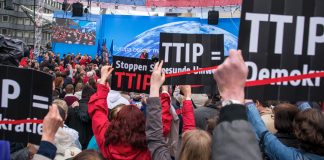EU
Ten Proposals to Beat the European Union
This collective text initiated by Eric Toussaint, of the CADTM campaign for the abolition of the debt of the global South has been collectively...
Brexit: Divorce by mutual consent or fight?
by Giullietto Chieza
According to Tomas Prouza - state secretary for EU Affairs in Prague - “There is a real danger that British politics, with...
Grenoble’s Response
Declaration of the second pan-European meeting of TTIP-free zones
60 years after its creation, the European Union is now at a crossroads. The different crises...
“New Yorker” on the New Cold War
By I.Soft Targets
On April 12, 1982, Yuri Andropov, the chairman of the K.G.B., ordered foreign-intelligence operatives to carry out “active measures”—aktivniye meropriyatiya—against the reëlection...
‘EU is particularly good at doing a terrible job’ – Yanis...
Former Greek Finance Minister Yanis Varoufakis has described the measures taken by the EU to settle the economic crisis in Greece as a “terrible...
First destroying, then expelling Greece. Shaeuble: a “German nationalist” acting in...
German Finance Minister Wolfgang Schaeuble on Wednesday brought back the Grexit issue by saying that unless Greece implements reforms it cannot stay in the...
Trump’s bonfire of banking rules could burn us all
By Nils Pratley
Original Post date: 6 February 2017
The last thing we want at this point in time is a relaxation of regulation,” said Mario...
The consequences of the EU’s international trade agreements for the European...
By George Emmanuel
Member of the Co-ordinating Committee of the Panhelladic Initiative of Organizations and Citizens against TTIP, CETA, TISA.
In the European Commission’s 2016 report...
Greek default: To be or not to be?
Dimitrios Konstantakopoulos
The following is from an interview transcript
The situation in Greece is a little bit complicated. You should remember that Greece is not any...
“America first”
By Serge Halimi
From his first speech as president, Donald Trump has parted ways with his predecessors. In scornful tones, and with clenched fist, he...









